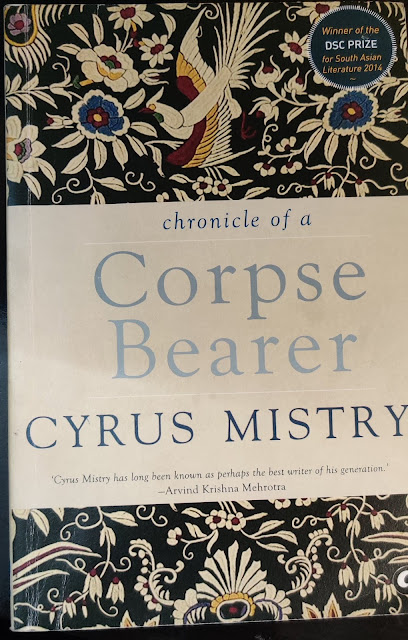Every book gives you some new insight, a new thought process or a point to ponder. That is why books are considered as guiding light leading us to new doors of knowledge world. So, when I picked Chronicle of a Corpse Bearer by Cyrus Mistry published by Aleph Book Company, I wasn’t aware of the content of the book but for the name. Few months passed by before the lockdown made me to pick up this beauty and reveal the mastery of words by Mistry.
The book is a combination of biographical account and fiction simultaneously of a secluded world on which very few literary works exist. It tells a tale of very small yet significant sub-caste of Parsi Corpse bearers called as Khandhias and Nussesalars. Parsis' who follow Zoroastrian religion are small close knit community mostly in Bombay and Gujarat and have unique way to dispose of the dead i.e. by keeping the body at top of the Tower of Silence and letting the vultures feed the body. The tradition is centuries old and followed till date.
Coming back to the book, it revolves around the life of a corpse bearer named Phiroze who was a son of Priest but accepted the job of which was considered lowly, to marry his love Sepidah who is daughter of a corpse bearer Temoo. Though the books main focus is corpse bearer, it gives considerable insights on the Parsi society, their cremation rituals, the family tiffs, the politics surrounding Parsi Punchayat which is highest decision making body of Parsi Community, the equations between various members, the discrimination met with the corpse bearers and most startling fact that there exists such casteism in Parsi which I was personally not aware.
The book starts in the time around 1940’s when freedom struggle was gathering pace and the world war was going on. The passing references to the freedom struggle in Mumbai are there. The book is based in Mumbai and the vivid description of the Maximum city refreshes one’s memory from Docks to Seweree and Cumbala Hills to Nariman Point. One interesting fact that I came to know that dogs were used to confirm the death of a person in Persia as he writes,
“Before modern medicine reserved that right for itself, it was canines that were believed to have an uncanny ability to sniff out the slightest flicker of vitality persisting in a body presumed dead.”
“its because people have forgotten the conjunction between hygiene and spirituality… or because they presume it is inconsequential.”
The book brings to the fore the intricate family relations existing between son and father, twin brothers, son-mother bond and how due to strained relation between father and son, parents’ relations are impacted. One powerful line
“Together we were defined, happy, ourselves. Alone, we were amorphous, directionless, rather lost.”
Stating his emotions Phiroze states,
"… like everyone else, you see, I was an egoist. I used to believe too much in myself. But this job makes you aware that all that self-importance is nothing but illusion. What is a man in the end, Phiroze, but the powder of a few dried bones…”. He adds "Hope, that palliative of every human suffering: in desperation, we cling to the flimsiest of straws."
In the latter part of the book when Phiroze is retired and old, he compares the pre-independence life with the present one and points:
“Politicians failed to act, reneged on promises; betrayed the people who elected them to office. Everywhere, everyone in public life, whoever he or she might be, is on the make, feathering a private nest. And so it has continued for decades. The only change I can make out in this compulsive industry is that incidents of fraudulence, cheating and theft of public money have accelerated both in frequency and volume beyond the wildest dreams of even those who first concocted them; until the very concept of probity in public life has become laughable.”
The book ends with a note as to how population of vultures is declining over the years due to usage of a drug named Diclofenac and affecting Parsi’s ritualistic sanctity. The Mistry’s mastery over word can be summed up in one of the closing paragraph as
“The longer the human soul swims in that pool of faith, soaking in the effulgence of its own dreams and longings, the more its need for rationality recedes, its very preoccupation with reality. Excuses are made for every frustration or impediment that doesn’t quite merge into the perfect blueprint of miraculous resolution already etched into one’s hopes and prayers: thus, there’s never any scope for disappointment. The person becomes blind to everything but bewitchment of his own beliefs.”
Summing up, I'll just add that this is a book which one can read to expand the understanding the Zoroastrian world and Parsi life and more particular their Corpse Bearers and last rites rituals.
Cyrus Mistry has done justice with the theme, with the subject and Khandhias.

Comments
Post a Comment